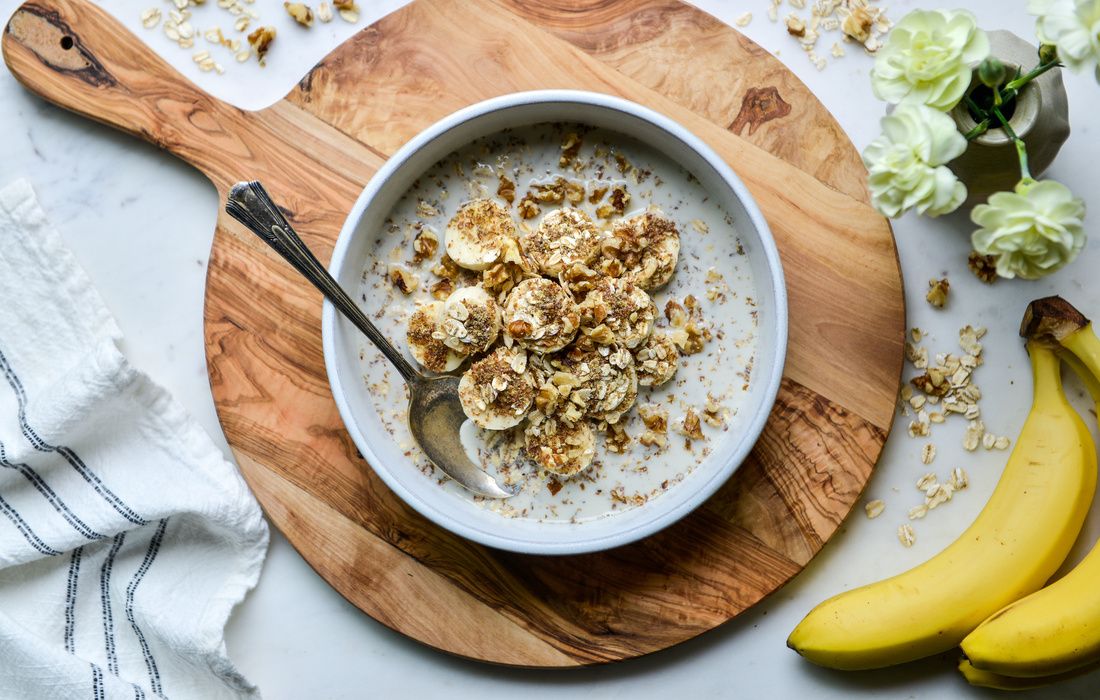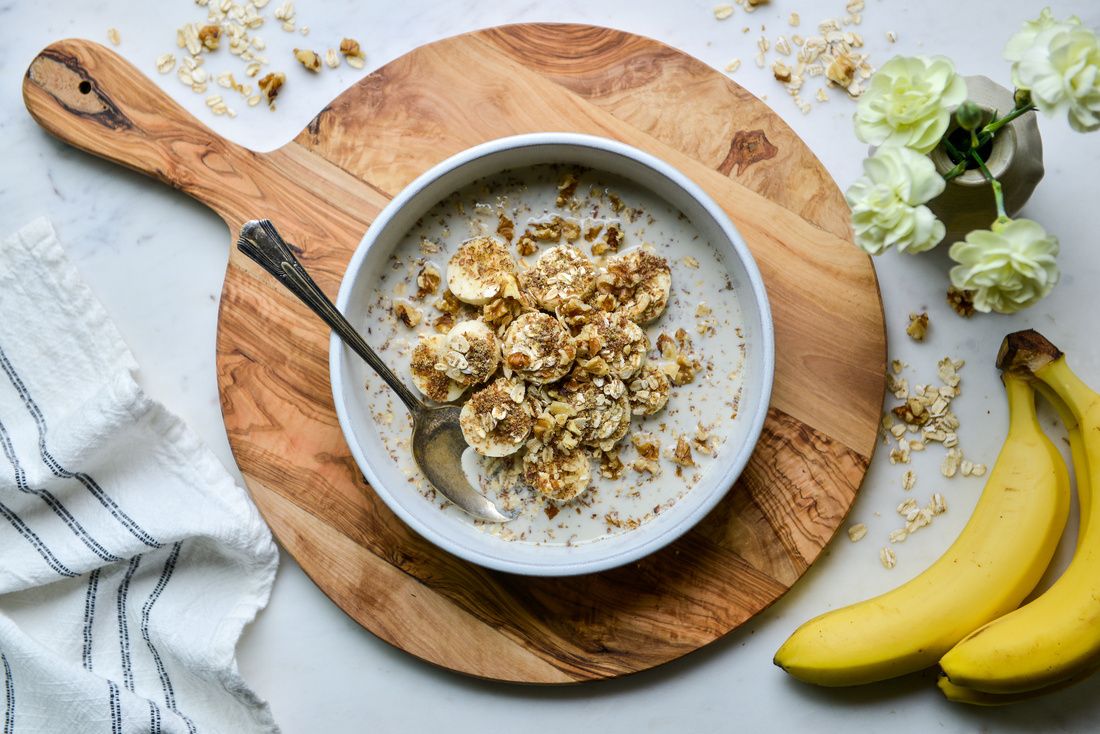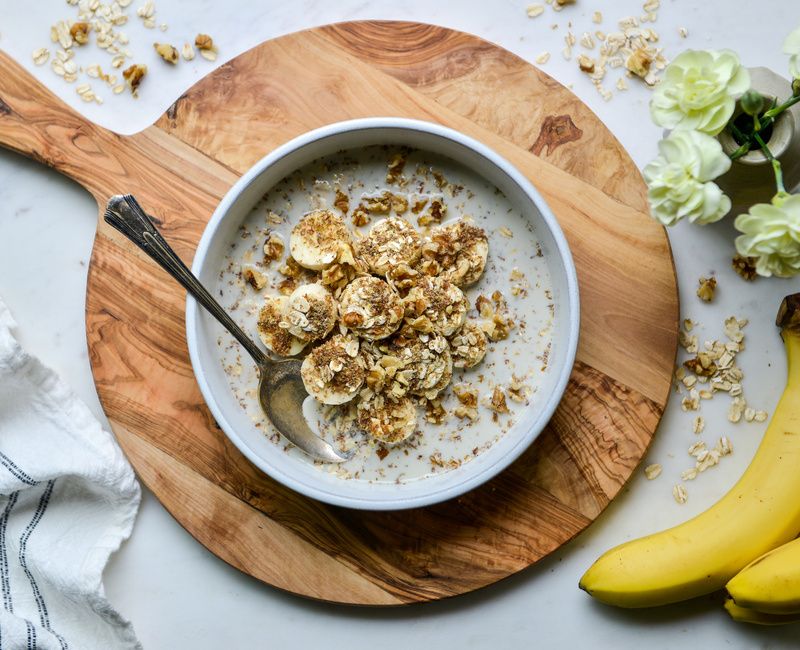Banana-Flax Cereal for Cortisol Imbalances
Ali Segersten Apr 24, 2023
Elevated cortisol levels can greatly affect the ability fall asleep and stay asleep. Cortisol is a hormone produced by the adrenal glands. It's a messenger that tells the body how to function. Cortisol is naturally highest beginning early in the morning, from around 6am to 8am. Then it slowly decreases throughout the day, getting to its lowest point around midnight. Acute stress, chronic stress, and trauma can all affect cortisol levels and cause this stress hormone to be higher late in the day when it shouldn't be.
Sometimes it can be difficult to remove the stressor, however, there are things you can do to lower elevated nighttime cortisol. Specific foods, eating patterns, deep breathing, and even changing your lightbulbs to use a different spectrum of light can help balance cortisol!
What are the symptoms of elevated cortisol?
- Difficulty falling asleep
- Nighttime waking
- Frequent urination during the night (cortisol suppresses antidiuretic hormone)
- High fasting blood glucose
- Reduction in stomach acid production (needed for proper digestion and gut bacterial balance)
- Elevated blood pressure
- Headaches and irritability
- Hair loss (from chronically elevated cortisol)
- Bone loss or low bone density (from chronically elevated cortisol)
I've seen quite a few women with cortisol imbalances begin to regain balance by eating a small amount of complex carbohydrates and fat in the late evening. If you are chronically stressed and not eating enough calories during the day, or eating too few complex carbohydrates for your body type, then your body will increase cortisol levels in order to increase blood glucose. If this happens at night, it can greatly affect your sleep.
Melatonin is the sleep hormone. Melatonin and cortisol work antagonistically, so when cortisol is elevated, melatonin drops. Your melatonin levels should be highest when cortisol is at its lowest point. Therefore, if you are very hungry in the evening (low blood sugar) and try to go to bed in this state, you will likely have a very difficult time falling asleep and staying asleep because this triggers the release of cortisol. There are a few ways to balance cortisol levels in order to increase melatonin levels in the evening and get deeper, better quality sleep.
Ways to decrease elevated cortisol at night:
This banana-flax cereal recipe has helped me through many years of stress, and has been helping other women I've worked with reduce elevated cortisol and get better sleep. Ground chia seeds can replace the flaxseed meal if desired. If you are on a grain-free diet, simply omit the rolled oats and increase the flax and walnuts. Use any type of non-dairy milk. I often use homemade raw cashew milk or raw vanilla almond milk! This "cereal" recipe is easy to make and can help keep blood sugar levels stable throughout the night to decrease cortisol levels and help you sleep.
- Consume balanced, anti-inflammatory meals throughout the day with enough protein at each meal. Make sure your breakfast meal is high in protein and fat. This will help your stress hormones to calm down later in the evening.
- Consume complex carbohydrates with your evening meal (brown rice, black rice, winter squash, sweet potato, cooked root vegetables).
- Add in raw walnuts as a snack in the evening. Walnuts contain melatonin, which will help raise blood levels of melatonin to help you sleep.
- Consume this Banana-Flax cereal as a bedtime snack. Use green tipped bananas (more starchy and less sweet). Add in at least 4 tablespoons of raw rolled oats. The raw oats are slow to digest and help to keep blood sugar levels stable during the night so cortisol doesn't spike.
- Consume magnesium-rich foods. Magnesium is needed to metabolize cortisol. Bananas, pumpkin seeds, almonds, chia seeds, cashews, rolled oats, and brown rice all good sources of magnesium.
- B-vitamins are also needed to metabolize cortisol. Whole grains, meat, fish, and vegetables contain the B vitamins needed to help break down excess cortisol.
- Make sure you are blocking blue light in the evening. Blue light from screens and certain light bulbs is a similar spectrum to sunlight. Bright sunlight stimulates the release of cortisol, therefore, your lightbulbs and screens can also do this in the evening when you need cortisol to be dropping. Use blue light blocking glasses and make sure any light bulbs you use in your house in the evening are under 2700K (warm yellow light).
- Exercise earlier in the day!
- Deep breathing exercises will stimulate the parasympathetic nervous system and can lower cortisol levels.
Need more inspiration for creating balanced, nutrient-dense meals? Become a Nourishing Meals member and gain instant access to over 1800 healthy recipes, plus our easy meal planning tools that allow you to quickly create grocery shopping lists and plan your meals in a calendar system!

About the Author
Alissa Segersten, MS, CN
Alissa Segersten, MS, CN, is the founder of Nourishing Meals®, an online meal-planning membership with over 2000 nourishing recipes and tools to support dietary change and better health. As a functional nutritionist, professional recipe developer, and author of The Whole Life Nutrition Cookbook, Nourishing Meals, and co-author of The Elimination Diet, she helps people overcome health challenges through food. A mother of five, Alissa understands the importance of creating nutrient-dense meals for the whole family. Rooted in science and deep nourishment, her work makes healthy eating accessible, empowering thousands to transform their well-being through food.Nourishing Meals Newsletter
Email updates.








Add Comment